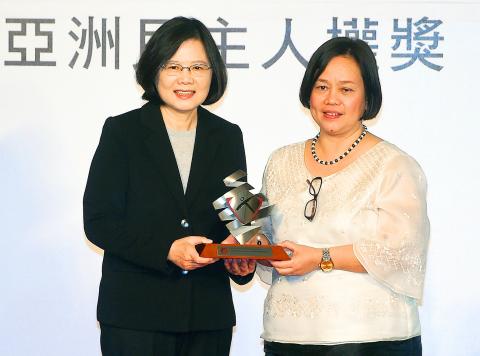President Tsai Ing-wen (蔡英文) yesterday pledged to complete the first-ever official investigative report on the White Terror era within three years, saying that past deeds could be forgiven, but not forgotten.
At an event to mark Human Rights Day at the Jingmei Human Rights Memorial and Cultural Park in New Taipei City, Tsai said the government was looking into “political files” regarding the White Terror era, calling them the “last piece of the puzzle” in the government’s investigative report.
“Going through all the documents is a mammoth task. Many of the political files from 1945 to the 1992 amendment to Article 100 of the Criminal Code are scattered among various government agencies, such as the Military Intelligence Bureau and the Investigation Bureau,” Tsai said.

Photo: Liao Chen-huei, Taipei Times
“Nevertheless, no matter how much dust that has accumulated on top of the files, we will dig out each and every one of them. We will let this part of history see the light of day,” she said.
The president said that the government’s attempt to achieve transitional justice does not target any individual or political party, nor is it aimed at galvanizing political conflict among ethnic groups.
“The experiences of political persecution go beyond ethnic boundaries,” Tsai said.
The White Terror era refers to a period of repression that began after the 228 Incident in 1947, when an anti-government uprising was violently suppressed by the then-Chinese Nationalist Party (KMT) government, which later declared martial law and initiated purges.
Historians estimate that between 10,000 and 30,000 people were killed during the crackdown.
During the event, Tsai also conferred upon the seven children of White Terror era victim Chang Yu-lan (張玉蘭) certificates that symbolically restore their mother’s dignity.
Chang, a deputy stationmaster at the Taiwan Railways Administration’s Pingtung Station, was subjected to severe torture during her 254-day detention after being arrested on suspicion of colluding with communist rebels.
Earlier yesterday, Tsai visited the Taiwan Foundation for Democracy to preside over an award ceremony presenting the Asia Federation Against Involuntary Disappearances with the Asia Democracy and Human Rights Award.
Taiwan is willing to commit to increased dialogue and interactions with the rest of the world on the issues of freedom, democracy and human rights, Tsai said.
The federation’s efforts have been one of the main causes for the UN to adopt the International Convention for the Protection of All Persons from Enforced Disappearances in 2006, and despite limited resources and political pressure, the federation has continued to track and help missing people.
One of the most common reasons for disappearances is political oppression, Tsai said, adding that Taiwan is willing to share its experiences to say thank you for the support and encouragement from the international community during the nation’s struggle for freedom and democracy.
The nation is willing to adopt closer cooperation with the federation, Tsai said, adding that she is looking forward to the foundation’s efforts to spread democracy, freedom and human rights not only to Asia, but also around the world.

CHAOS: Iranians took to the streets playing celebratory music after reports of Khamenei’s death on Saturday, while mourners also gathered in Tehran yesterday Iranian Supreme Leader Ayatollah Ali Khamenei was killed in a major attack on Iran launched by Israel and the US, throwing the future of the Islamic republic into doubt and raising the risk of regional instability. Iranian state television and the state-run IRNA news agency announced the 86-year-old’s death early yesterday. US President Donald Trump said it gave Iranians their “greatest chance” to “take back” their country. The announcements came after a joint US and Israeli aerial bombardment that targeted Iranian military and governmental sites. Trump said the “heavy and pinpoint bombing” would continue through the week or as long

TRUST: The KMT said it respected the US’ timing and considerations, and hoped it would continue to honor its commitments to helping Taiwan bolster its defenses and deterrence US President Donald Trump is delaying a multibillion-dollar arms sale to Taiwan to ensure his visit to Beijing is successful, a New York Times report said. The weapons sales package has stalled in the US Department of State, the report said, citing US officials it did not identify. The White House has told agencies not to push forward ahead of Trump’s meeting with Chinese President Xi Jinping (習近平), it said. The two last month held a phone call to discuss trade and geopolitical flashpoints ahead of the summit. Xi raised the Taiwan issue and urged the US to handle arms sales to

State-run CPC Corp, Taiwan (CPC, 台灣中油) yesterday said that it had confirmed on Saturday night with its liquefied natural gas (LNG) and crude oil suppliers that shipments are proceeding as scheduled and that domestic supplies remain unaffected. The CPC yesterday announced the gasoline and diesel prices will rise by NT$0.2 and NT$0.4 per liter, respectively, starting Monday, citing Middle East tensions and blizzards in the eastern United States. CPC also iterated it has been reducing the proportion of crude oil imports from the Middle East and diversifying its supply sources in the past few years in response to geopolitical risks, expanding

Pro-democracy media tycoon Jimmy Lai’s (黎智英) fraud conviction and prison sentence were yesterday overturned by a Hong Kong court, in a surprise legal decision that comes soon after Lai was jailed for 20 years on a separate national security charge. Judges Jeremy Poon (潘兆初), Anthea Pang (彭寶琴) and Derek Pang (彭偉昌) said in the judgement that they allowed the appeal from Lai, and another defendant in the case, to proceed, as a lower court judge had “erred.” “The Court of Appeal gave them leave to appeal against their conviction, allowed their appeals, quashed the convictions and set aside the sentences,” the judges